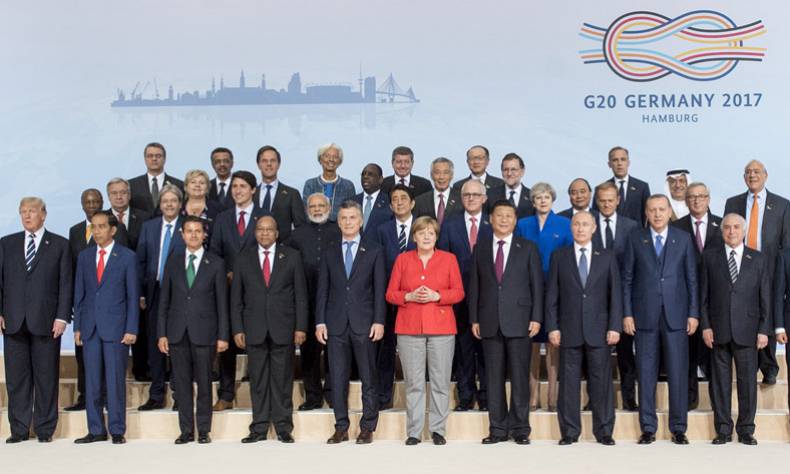
Globalization Fights Its Way Forward
The Leaders Declaration issued after the G20 summit documents a full set of commitments, including further collaboration between G20 members in favor of balanced, sustainable and inclusive global economic growth, and a global architecture for financial governance.
After tenacious efforts by all G20 members, with the US as a dissenting voice, the recent G20 Hamburg Summit maintained the basic course of the G20 on global governance for a prosperous global economy. This was achieved against a strong headwind of systemic de-globalization policies proposed by President Donald Trump of the US.
The Leaders Declaration issued after the G20 summit documents a full set of commitments, including further collaboration between G20 members in favor of balanced, sustainable and inclusive global economic growth, and a global architecture for financial governance. The Summit upheld free trade and opposed protectionism. It also reiterated the firm commitment of all G20 members to the Paris Accord, again with the exception of the US. The Summit reached extensive consensus on the digital economy, fighting terrorism, and support for the UN 2030 SD Agenda and Africa. In most areas, the G20 Hamburg Summit maintained continuity with the G20 Hangzhou Summit in 2016.
However, the G20 Hamburg summit has some distinctive features.
Firstly, the retreat from free trade and fighting protectionism. Under the German presidency the G20 dropped the Trade Ministers Meeting, an important mechanism set up by the G20 under the Chinese presidency last year. After arduous efforts, the Hamburg summit made progress in three areas supporting free trade as documented in the Leaders Declaration, which calls for keeping markets open and fighting protectionism, and for a WTO-consistent, rule-based global trading system.
It did offer some trade-offs to Donald Trump’s protectionism. The Leaders Declaration recognizes all unfair trade practices as protectionism, implying that it is not the US but its trading partners that are pursuing protectionism, through unfair trading practices with the US. Additionally, the Leaders Declaration recognizes “the role of legitimate trade defense instruments in this regard”. In principle, this is appropriate. However, trade defense instruments are legitimate only when they are based on WTO rules, rather than national laws. But the Trump Administration will undoubtedly implement restrictive measures based on its domestic laws. It is estimated that a severe US import restriction on steel is imminent. If this happens, Donald Trump can be expected to claim its legitimacy, and the EU is likely to respond with strong retaliation.
If it follows a 19+1 approach, the outcome of the trade issue might be more positive. Under such an approach, the Leaders Declaration could specify that with the exception of the US, which takes a different position, all G20 members support free trade and fighting protectionism.
Secondly, for the first time in its history the G20 Hamburg Summit adopted the 19+1 approach on the issue of Paris Accord. This sends the world a strong signal that the Paris Accord is irreversible. In the meantime, the US position is also respected. All G20 members will enhance cooperation on clean energy.
Thirdly, shaping globalization to the benefit of all. The G20 Hamburg summit did not evade the problems and challenges resulting from globalization. Rather than restricting itself to platitudes, the Leaders Declaration stated that “Globalization has created challenges, and its benefits have not been shared widely enough.” Opposition to globalization comes from two different sources: on the one hand, the political and economic doctrines and policies of Donald Trump, and on the other, hostility from ordinary people, who see globalization taking away their jobs and incomes. The demonstrations and even violence outside the venue of the summit were nothing strange. Similar demonstrations took place in Seattle during the WTO Third Ministerial Conference in December, 1999. For the demonstrators, globalization must be inclusive, benefiting all people alike. All people in all countries should be equal. For “American first”, inclusiveness still applies.
The summit went beyond expressing simple support for digitalisation, specifying a need to “harness” digitalisation to ensure that advancing technology will not create income, age, gender or geographical inequality, and placing a special emphasis on employment and training. This is a direct continuation of the G20 Hangzhou Summit, which called for inclusiveness, but it represents a further step forward.
Fourth, UN 2030 Agenda for SD took center stage. Trade and investment, actions on climate change and the Paris Accord, digitalisation, and African Partnership should all be consistent with the Agenda. In this regard, the G20 Hamburg Summit took further concrete steps forward in supporting African development.
China made a substantial contribution to the conclusions and the results of the summit, which provided further evidence that Donald Trump’s “America First” policies are creating uncertainties and difficulties for the world economy and the process of globalization. As the US steps away from its global responsibilities, China, Germany and other countries will take on a greater role.
The Summit has proved once again that the Belt and Road Initiative proposed by Chinese President Xi Jinping is a significant and practical route forward towards inclusive globalization, benefiting all people and bringing prosperity to all the economies along the route. It will also make a solid contribution to achieving UN 2030 Agenda goals.
The G20 Hamburg Summit also tells us that the G20 mechanism needs to be updated. The principle of unanimity is no longer effective in dealing with several key issues. The G20 family needs new members and new collaboration with other multilateral mechanisms, especially the UN, OECD, IMF, WB and WTO.
Only by keeping abreast with the changing world can the G20 maintain its vitality as a major platform for global governance, ensuring the balanced, sustainable and inclusive growth of the global economy.
(The author is senior fellow, Chongyang Institute for Financial Studies, Renmin Univ., and senior fellow, Center for China and Globalization)
 Facebook
Facebook
 Twitter
Twitter
 Linkedin
Linkedin
 Google +
Google +











“Fights Its Way Forward”, seems not easy.